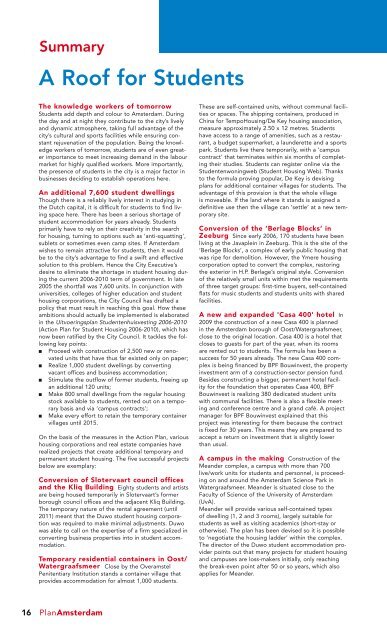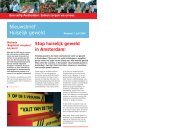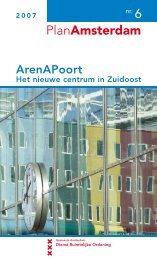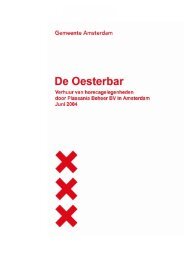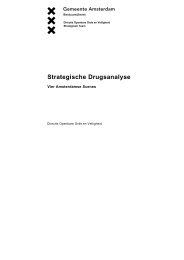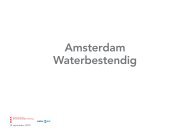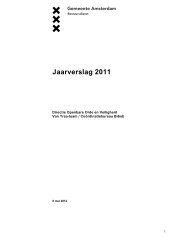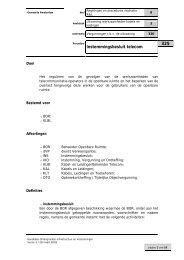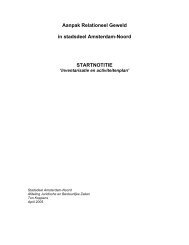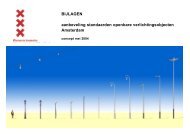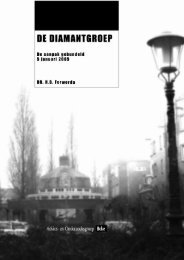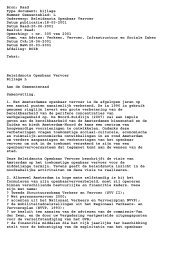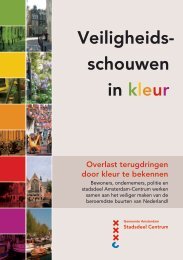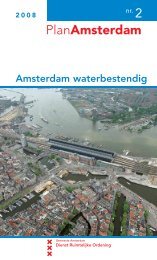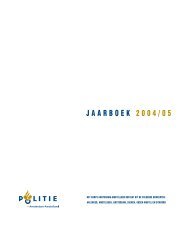downloaden - Gemeente Amsterdam
downloaden - Gemeente Amsterdam
downloaden - Gemeente Amsterdam
Create successful ePaper yourself
Turn your PDF publications into a flip-book with our unique Google optimized e-Paper software.
Summary<br />
A Roof for Students<br />
The knowledge workers of tomorrow<br />
Students add depth and colour to <strong>Amsterdam</strong>. During<br />
the day and at night they contribute to the city’s lively<br />
and dynamic atmosphere, taking full advantage of the<br />
city’s cultural and sports facilities while ensuring constant<br />
rejuvenation of the population. Being the knowledge<br />
workers of tomorrow, students are of even greater<br />
importance to meet increasing demand in the labour<br />
market for highly qualified workers. More importantly,<br />
the presence of students in the city is a major factor in<br />
businesses deciding to establish operations here.<br />
An additional 7,600 student dwellings<br />
Though there is a reliably lively interest in studying in<br />
the Dutch capital, it is difficult for students to find living<br />
space here. There has been a serious shortage of<br />
student accommodation for years already. Students<br />
primarily have to rely on their creativity in the search<br />
for housing, turning to options such as ‘anti-squatting’,<br />
sublets or sometimes even camp sites. If <strong>Amsterdam</strong><br />
wishes to remain attractive for students, then it would<br />
be to the city’s advantage to find a swift and effective<br />
solution to this problem. Hence the City Executive’s<br />
desire to eliminate the shortage in student housing during<br />
the current 2006-2010 term of government. In late<br />
2005 the shortfall was 7,600 units. In conjunction with<br />
universities, colleges of higher education and student<br />
housing corporations, the City Council has drafted a<br />
policy that must result in reaching this goal. How these<br />
ambitions should actually be implemented is elaborated<br />
in the Uitvoeringsplan Studentenhuisvesting 2006-2010<br />
(Action Plan for Student Housing 2006-2010), which has<br />
now been ratified by the City Council. It tackles the following<br />
key points:<br />
n Proceed with construction of 2,500 new or renovated<br />
units that have thus far existed only on paper;<br />
n Realize 1,000 student dwellings by converting<br />
vacant offices and business accommodation;<br />
n Stimulate the outflow of former students, freeing up<br />
an additional 120 units;<br />
n Make 800 small dwellings from the regular housing<br />
stock available to students, rented out on a temporary<br />
basis and via ‘campus contracts’;<br />
n Make every effort to retain the temporary container<br />
villages until 2015.<br />
On the basis of the measures in the Action Plan, various<br />
housing corporations and real estate companies have<br />
realized projects that create additional temporary and<br />
permanent student housing. The five successful projects<br />
below are exemplary:<br />
Conversion of Slotervaart council offices<br />
and the Kliq Building Eighty students and artists<br />
are being housed temporarily in Slotervaart’s former<br />
borough council offices and the adjacent Kliq Building.<br />
The temporary nature of the rental agreement (until<br />
2011) meant that the Duwo student housing corporation<br />
was required to make minimal adjustments. Duwo<br />
was able to call on the expertise of a firm specialized in<br />
converting business properties into in student accommodation.<br />
Temporary residential containers in Oost/<br />
Watergraafsmeer Close by the Overamstel<br />
Penitentiary Institution stands a container village that<br />
provides accommodation for almost 1,000 students.<br />
These are self-contained units, without communal facilities<br />
or spaces. The shipping containers, produced in<br />
China for TempoHousing/De Key housing association,<br />
measure approximately 2.50 x 12 metres. Students<br />
have access to a range of amenities, such as a restaurant,<br />
a budget supermarket, a launderette and a sports<br />
park. Students live there temporarily, with a ‘campus<br />
contract’ that terminates within six months of completing<br />
their studies. Students can register online via the<br />
Studentenwoningweb (Student Housing Web). Thanks<br />
to the formula proving popular, De Key is devising<br />
plans for additional container villages for students. The<br />
advantage of this provision is that the whole village<br />
is moveable. If the land where it stands is assigned a<br />
definitive use then the village can ‘settle’ at a new temporary<br />
site.<br />
Conversion of the ‘Berlage Blocks’ in<br />
Zeeburg Since early 2006, 170 students have been<br />
living at the Javaplein in Zeeburg. This is the site of the<br />
‘Berlage Blocks’, a complex of early public housing that<br />
was ripe for demolition. However, the Ymere housing<br />
corporation opted to convert the complex, restoring<br />
the exterior in H.P. Berlage’s original style. Conversion<br />
of the relatively small units within met the requirements<br />
of three target groups: first-time buyers, self-contained<br />
flats for music students and students units with shared<br />
facilities.<br />
A new and expanded 'Casa 400' hotel In<br />
2009 the construction of a new Casa 400 is planned<br />
in the <strong>Amsterdam</strong> borough of Oost/Watergraafsmeer,<br />
close to the original location. Casa 400 is a hotel that<br />
closes to guests for part of the year, when its rooms<br />
are rented out to students. The formula has been a<br />
success for 50 years already. The new Casa 400 complex<br />
is being financed by BPF Bouwinvest, the property<br />
investment arm of a construction-sector pension fund.<br />
Besides constructing a bigger, permanent hotel facility<br />
for the foundation that operates Casa 400, BPF<br />
Bouwinvest is realizing 380 dedicated student units<br />
with communal facilities. There is also a flexible meeting<br />
and conference centre and a grand café. A project<br />
manager for BPF Bouwinvest explained that this<br />
project was interesting for them because the contract<br />
is fixed for 30 years. This means they are prepared to<br />
accept a return on investment that is slightly lower<br />
than usual.<br />
A campus in the making Construction of the<br />
Meander complex, a campus with more than 700<br />
live/work units for students and personnel, is proceeding<br />
on and around the <strong>Amsterdam</strong> Science Park in<br />
Watergraafsmeer. Meander is situated close to the<br />
Faculty of Science of the University of <strong>Amsterdam</strong><br />
(UvA).<br />
Meander will provide various self-contained types<br />
of dwelling (1, 2 and 3 rooms), largely suitable for<br />
students as well as visiting academics (short-stay or<br />
otherwise). The plan has been devised so it is possible<br />
to ‘negotiate the housing ladder’ within the complex.<br />
The director of the Duwo student accommodation provider<br />
points out that many projects for student housing<br />
and campuses are loss-makers initially, only reaching<br />
the break-even point after 50 or so years, which also<br />
applies for Meander.<br />
16 Plan<strong>Amsterdam</strong>


